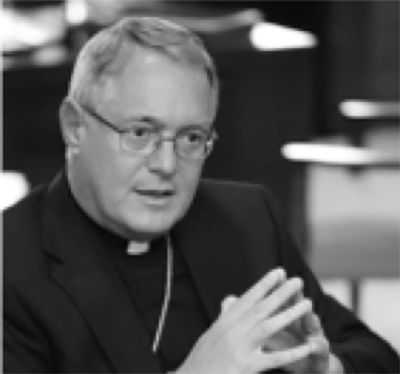Diocese Admits Teachers’ Retirement Fund in Distress, Blames Individuals Who Unveiled Key Documents
Monday, July 02, 2018
The Diocese of Providence has sent a memo to members of the Diocesan Lay Employees' Retirement Fund after a GoLocal investigation unveiled that the fund was in severe economic distress -- and chastised individuals for going public with the information.
The GoLocal report based on Diocese' financial information showed that members of the fund are facing significant cutbacks to their benefits and some members — and those with under ten years and yet to be vested in the fund would lose all the contributions made to the fund on their behalf.
In the Memorandum, authored by Monsignor Raymond Bastia and Michael Sabatino of the Diocese of Providence’s fiscal office, the Diocese for the first time was forced to admit that the fund is facing “financial stress.” Documents GoLocal previously unveiled quoted Diocese documents that stated, "Even with the revised more realistic assumptions, if we make these changes, it will still take 30-35 years to fully fund the Plan."
GET THE LATEST BREAKING NEWS HERE -- SIGN UP FOR GOLOCAL FREE DAILY EBLASTAs the Diocese refuses to be interviewed, provide financial data or report on the status of the financial condition of the fund, retirees are concerned that the fund may collapse.
Document of the Diocese previously reported on by GoLocal, show that The impact on those non-vested staffers is that they will lose all of the pension contributions made into their accounts if the plan is approved. Other big impacts are the fund will be frozen and fund members wanting to exit the fund, who may be concerned that the fund will collapse, could be allowed to exit -- but will take a 40 percent cut to their lump sum payment.
For a nine-year teacher who has taught for nine years and had an annual average salary of $50,000 over those years, they would have accrued an estimated $54,000, but under the plan to be adopted by the Diocese -- that teacher will receive zero.
Diocese Blames Whistleblowers
The memo to retirees affirms what GoLocal has learned, that Bishop Thomas Tobin is furious that news of the cuts to retirees was leaked by officials. The memo cites, “It is unfortunate that someone entrusted with participation in the process chose not to respect professional confidentiality and interrupted the process by leaking discussion materials to the media.”
However, the reality is that the documents released by GoLocal were not discussion documents — they were the final proposed plan to be implemented. The meeting last Thursday at the Diocese’s Chancellory was to receive a final vote — the only remaining step was final approval to the benefits by Tobin.
Second Pension Failure
The concerns continue to grow about the Catholic school's pension fund, as the litigation continues to grow regarding the collapse of the St. Joseph pension fund.
Earlier in June, lawsuits were filed that allege massive fraud in the case which has created a hole in pension assets estimated to be in excess of $115 million. The suit was filed by the receiver Stephen Del Sesto and was prepared by the special investigator Max Wistow and his law associates Stephen Sheehan and Benjamin Ledsham.
The Federal Court complaint is 136 pages and includes a 21 count complaint filed against 14 Defendants. Similarly, the state court complaint is 101 pages and includes 16 count complaint against same defendants.
According to court documents, the parties knew that the post-2014 transaction which orphaned the pension fund would have “catastrophic implications” of that failure.
Further, the suit lays out that “Bishop Thomas Tobin did not disclose in his letter to the Vatican that the proposed asset sale increased the probability of the Plan failing. Instead, Bishop Tobin omitted that information and, in effect, said the opposite, that approval of the asset sale was actually necessary to secure the Plan.”
The suit goes on to assert, "On September 27, 2013, Tobin signed his letter as altered by [legal] counsel for [St. Joseph Health Services, CharterCare and Roger Williams Hospital] and sent it to the Vatican.”
The parties knew the implications, “These misrepresentations and omission concerning the Plan in the Bishop’s letter to the Vatican…all understood that Vatican approval was required for the transaction to proceed..”
The Diocese documents layout some significant cutbacks to members of the Lay Employee’s Retirement Fund:
As stated in the documents:
In conjunction with the Plan actuaries, the revised assumptions are as follows:
* 6.75% long-term investment return expectations
* Most recently published mortality tables by Society of Actuaries
* 2% annual decline in participant population for 10 years followed by 1% declines
* 2% annual pay increases
Under these revised assumptions, it is understood, that unless we increase contributions by nearly 15% - and there is no appetite for that - the Plan is likely to become insolvent before 2047. Therefore, the 2017 Subcommittee also is recommending:
* A full freeze of the Plan (no new participants are accruals)
* No change to benefits of folks that have retired
* No change to accrued benefits through the date of the freeze
* No change to payroll contributions (remains at 12% of the full-time payroll)
* Amed the withdrawal liability provisions of the Plan to require approval for any employer to withdraw after the freeze
* Offer a voluntary discounted lump-sum buyout to certain participants
* Fund a partial replacement defined contribution benefit
Even with the revised more realistic assumptions, if we make these changes, it will still take 30-35 years to fully fund the Plan.
Related Slideshow: 10 Shocking Elements of the St. Joseph Pension Fund Lawsuit Against the Diocese and Others
Related Articles
- INVESTIGATION: Diocese Underfunded St. Joseph Pension Fund by $100 Million
- Coming Monday - INVESTIGATION: The Real Cost of the St. Joseph Pension Fund Collapse
- Key Trust Document Shows Bishop of Providence Has Oversight of Failed St. Joseph Pension Fund
- LIVE: Whitcomb on Al Franken’s Demise, St. Joseph’s Pension Debacle, and More
- Kilmartin Knew of St. Joseph’s Pension Collapse 10 Days Before Failure
- Diocese, Kilmartin’s Legal Delays Are Increasing Costs to Recover Monies For St. Joseph Pension
- Judge Slams Kilmartin for Delaying Release of Documents in St. Joseph Pension Fund Collapse
- St. Joseph Pensioner Quinn Worked 34-Years and Now Facing Cuts to Her $500 a Month Payment
- Callaci: Memorial Hospital’s Closure & St. Joseph Pension Failure Show State of Healthcare
- Kilmartin Tries to Block Release of Records in St. Joseph Pension Fund Collapse
- Diocese Fights to Quash Subpoena for St. Joseph Pension Fund, Wistow Fires Back
- Judge Stern Shoots Down Prospect and Attorney General in St. Joseph Pension Fund Collapse
- DelSesto, Receiver for Failed St. Joseph Pension Fund, Unveils Next Steps in Investigation
- Massive Lawsuits: Lawyers for Failed St. Joseph Pension Fund Sue Catholic Church and CharterCare
- UNAP Issues Statement Following Lawsuit Filed in St. Joseph’s Pension Collapse
- 10 Shocking Elements of the St. Joseph Pension Fund Lawsuit Against the Diocese and Others
- 900K+ Documents Reviewed in Filing Lawsuits, Says St. Joseph Pension Fund Receiver Del Sesto on LIVE
- Raimondo Signs Bills to Help Settle Lawsuits in St. Joseph’s Pension Collapse
- St. Joseph Pension Plan, UHIP Progress & More: This Week at the State House
- 6 Months After The Biggest Pension Collapse in RI - What is the Status of St. Joseph’s Fund?
- Subpoena Issued to RI Foundation on $8.2M Questionable Gift Tied to St. Joseph Pension Fund Collapse
- Feds Issue Subpoenas on St. Joseph Pension Fund Collapse
- Senate Passes Bill Encouraging Settlements in St. Joseph Pension Fund Collapse
- RI Foundation’s Lawyer Delays Agreement on Preservation of $8.8M in Charitable Assets in St. Joseph



_360_360_90_180_180_90.jpg)
_360_198_90.jpg)










